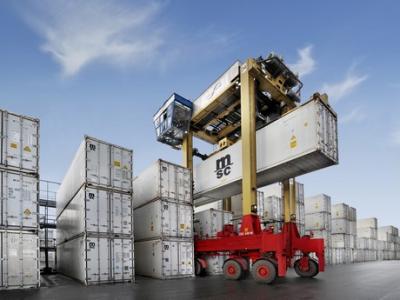The same considerations must be made in port, which means a reliable connection to the grid, or the possibility to back up power with emergency electricity solutions in areas with under-developed infrastructure. Meanwhile, on energy issues, sustainability is also front of mind, as “the most sustainable form of cargo transportation” needs to become even greener.
Just like other shipping companies MSC Mediterranean Shipping Company is investing in the reefer segment. “I am happy to say that the fleet continues to grow in response to market demands and in tandem with the overall growth of MSC’s business, which may handle as much as 20 million TEUs of every conceivable type of cargo this year,” says Antonino Ferraiolo, a reefer expert at MSC. The company shipped 1.4 million TEU of chilled and frozen cargo in 2017 alone. “We have more than 1000 reefer experts dedicated to advising customers such as fruit producers and shippers on how best to prepare their goods for transportation and help them reach existing and new markets.”
Container shipping hasn’t had an easy time of late, with significant consolidation in the industry and a number of high profile mergers and acquisitions, as well as the bankruptcy of Hanjin, once the 7th largest container shipping line. “MSC has stayed independent and strong throughout this period and many of our customers in the reefer sector appreciate the stability of the company and the long-term partnerships we offer to clients.”
Changes in fuel prices have also been impacting all carriers. “If the price goes up dramatically, and stays high, then some of that cost may be passed on to our customers, who have in general benefited from a significant decline in freight rates in the past two decades.” Container freight rates have fallen by over half in the past 20 years after inflation is taken into account, according to a recent analysis by Alphaliner. “Meanwhile bunker fuel prices have increased more than five-fold since 1998.”
MSC, however, made a significant recent investment as a sure sign it expects to continue to grow while it navigates the tough industry market conditions. Last year the shipping company invested in 11 new vessels with each a capacity of 23.000 TEU. The new tonnage would offset some mid-sized vessels expected to come off-hire. These new vessels will be the largest in a fleet of 510 and are expected to be involved with some of the important trade routes for fruit and vegetables. “We pride ourselves on offering global service coverage with local knowledge, following market demands everywhere,” Antonino added. “Our local agency teams provide personal advice and support to fruit producers and shippers in every country.”
Emergency electricity in energy unsecure portsThe market for reefers will keep on growing in the coming years, despite different factors have an impact on the market. “In general we expect to grow the volume of chilled and frozen goods we ship each year and we continue to invest in this area of our business.” MSC’s 200 ocean liner services call at more than 500 ports. “Reefer containers are loaded and discharged and we provide storage depots and overland transportation solutions to help customers right the way along the supply chain. In some countries, where the power supply is less reliable, we will even provide our own emergency electricity generation systems so we can still serve shippers with reefer containers.”
The reefer fleet exists out of PrimeLINE reefer containers, build by Carrier Transicold. “These are the most efficient and environmentally-friendly units in their energy class,” describes Antonino. Clients ask about sustainability of MSC. “Shipping is already the most environmentally-friendly form of cargo transportation, although we continue to strive to improve our environmental performance by equipping our fleet with the latest green technologies and managing to reduce our carbon emissions intensity each year.”
Next to this the company is constantly working on the application of new technologies for reefer services.“MSC provides regular and frequent monitoring of shipments, from receipt of a loaded container to final delivery. Our containers are fitted with software programmed to display specific alarm codes, should a malfunction be detected.”
Growing market in AsiaThe growing market in Asia is a “fascinating story… clearly the twin factors of population increase and economic development have created a larger consumer base and rising appetite for imported fruit,” says Antonino. “For example, our services between Europe and Asia are increasingly popular.” Containers used on these routes are subject to cold treatment, a procedure to eliminate pests and avoid them spreading to other locations. “Of course, there also many other export routes to note, for example, between South America and Asia,” Antonino follows. “MSC believes in applying the latest technologies to guarantee the success of fruit transportation in perfect conditions, whatever the destination, and has relationships with a number of suppliers of controlled atmosphere systems.” (RM)





